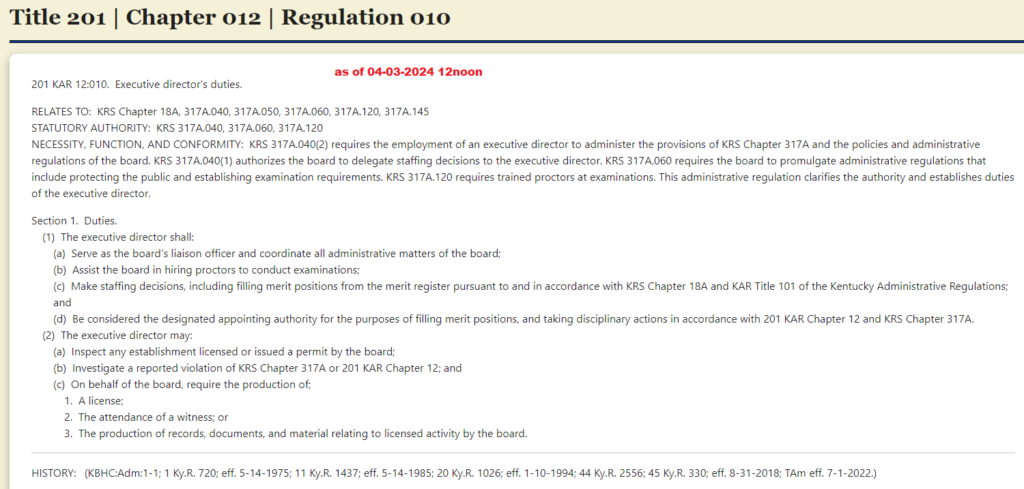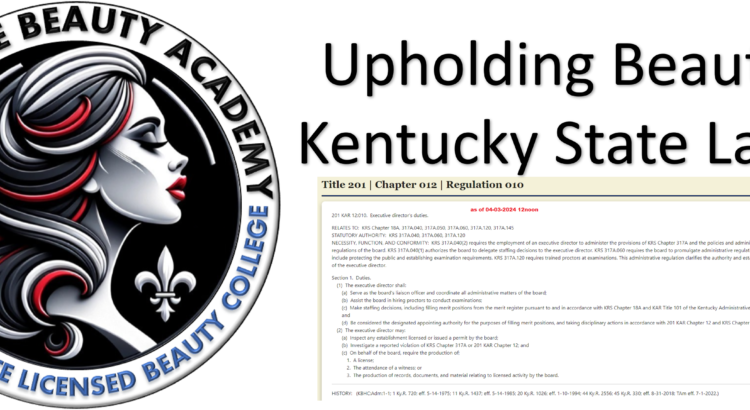In the ever-evolving landscape of the beauty industry, Louisville Beauty Academy stands as a beacon of excellence and compliance. As a Kentucky State-Licensed and State-Accredited Beauty College, we are committed to not only providing top-notch education but also ensuring that our students and the public are well-versed in the latest updates of Kentucky state law.
This commitment extends to understanding the roles and boundaries of government officials, such as the administrators of the Kentucky State Board of Cosmetology, to protect the interests of both the public and licensees.
201 KAR 12:010. Executive director’s duties” outlines the roles and responsibilities of the executive director of the Kentucky State Board of Cosmetology
The document “201 KAR 12:010. Executive director’s duties” outlines the roles and responsibilities of the executive director of the Kentucky State Board of Cosmetology, including serving as the board’s liaison, coordinating administrative matters, assisting in hiring proctors, and making staffing decisions. The executive director also has the authority to inspect establishments, investigate violations, and require the production of licenses or records related to licensed activity.
Understanding Sovereign Immunity and its Limitations in Government Official Conduct
While the concept of “sovereign immunity” generally protects government officials like the executive director from personal liability for actions taken in their official capacity, this protection is not absolute. Actions outside the scope of official duties, violations of the law, or conduct that is clearly beyond their authority can potentially expose them to legal action. The board itself may also face lawsuits even if the individual executive director is protected. It is essential to consult with legal professionals to understand the specifics of how immunity applies in various situations, and it is emphasized that running outside of the scope is strictly prohibited.
Sovereign Immunity and Ethical Conduct: Ensuring Government Employees Stay Within Legal Boundaries
Discrimination Protection: The Kentucky Civil Rights Act (KRS Chapter 344) strictly prohibits discrimination based on race, gender, religion, or nationality. It is crucial for government employees, such as state board executive directors, to uphold these principles of equality in their official duties and interactions.
Retaliation Safeguards: KRS 344.280 makes it unlawful to retaliate against individuals exercising their legal rights. Government officials must ensure that any complaints or concerns raised are addressed fairly and without retribution, promoting a culture of transparency and accountability.
Corruption and Misconduct: The beauty industry, like any other, is not immune to ethical challenges. KRS Chapter 521 and KRS 522.020 address bribery, corrupt influences, and official misconduct. It is imperative for government employees to uphold the highest standards of integrity and maintain a corruption-free environment.
Financial Stewardship: Misuse of funds is a serious offense under KRS 45A.645 and KRS 45A.990. Government officials must commit to financial transparency and responsible management of resources, ensuring accountability and proper use of public funds.
Abuse of Power: KRS 522.020 and KRS 522.030 address official misconduct and abuse of public office. It is essential for government employees to demonstrate ethical leadership and exercise their authority responsibly, adhering to the legal and ethical standards expected of their positions.In summary, government employees, including state board executive directors, must navigate their roles with a strong commitment to ethical conduct, legal compliance, and the protection of public interests.
Conclusion: At Louisville Beauty Academy, we are not just shaping future beauty professionals; we are molding responsible citizens who are aware of their rights and the legal frameworks that govern their industry. By keeping our students and the public informed about the latest developments in Kentucky state law and the role of administrators, we are contributing to a more informed, ethical, and vibrant beauty community. Our commitment to legal compliance and ethical conduct is unwavering, as we continue to set the standard for excellence in beauty education.

Disclaimer: The information provided in this article is for informational purposes only and is not intended as legal advice. While we strive to keep the content up to date and accurate, we make no representations or warranties of any kind, express or implied, about the completeness, accuracy, reliability, suitability, or availability with respect to the information, products, services, or related graphics contained in this article for any purpose. Any reliance you place on such information is therefore strictly at your own risk. For specific legal advice or concerns, please consult with a qualified attorney or the appropriate regulatory authority.





